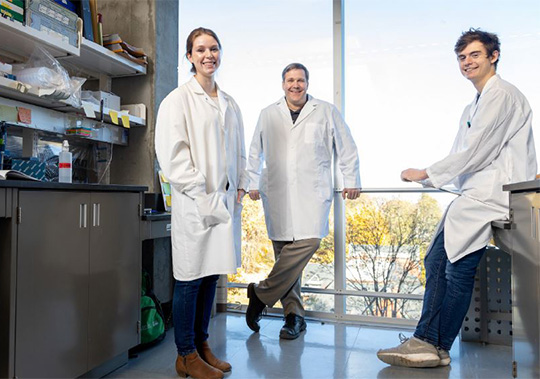Powering off cancer: Slowing down the spread of aggressive breast cancers by targeting their cellular powerhouse

One in eight Canadian women will be diagnosed with breast cancer during their lifetime, according to the Canadian Cancer Society. Even though research has led to major advances in screening and treatments, stage 4 breast cancers remain a challenge. In Canada, the five-year survival rate for stage 4 breast cancer is around 23%.
Researchers like Dr. Julie St-Pierre at the University of Ottawa and Dr. Peter Siegel at McGill University are tapping into fundamental science to explore promising new treatments against these aggressive forms of breast cancer. The team recently found evidence that changes in the way cancer cells are powered could slow down metastasis in hard-to-treat breast cancers.
It all started when the team was investigating mitochondria, the energy-producing organelles within cells. “Mitochondria play an important role in cellular metabolism; they are the cell’s powerhouse,” says Dr. St-Pierre.” In cancer cells, mitochondria show a remarkable ability to change, fusing together or fragmenting, as they adapt to external stressors and generate cellular energy. “We were curious to find out if the way mitochondria were organized had an impact on how breast cancer cells can spread to other parts of the body,” adds Dr. Siegel.
In their lab, the team observed that highly metastatic breast cancer cells tended to have more fragmented mitochondria, whereas less aggressive cancer cells had fused mitochondria. To further investigate this link, Drs. St.-Pierre and Siegel identified a gene expression pattern from cancer cells with fused mitochondria. In a large dataset of human breast cancers, they found that patients whose tumours had this pattern had improved survival rates.
The team also looked for existing drugs that could promote mitochondrial fusion in breast cancer cells. A promising candidate was leflunomide, a medication used to treat rheumatoid arthritis. Back to the lab, they were excited to discover that leflunomide led to mitochondrial fusion and slowed the progression of breast cancer metastasis in mice.

Drs. St-Pierre and Siegel are now consulting with the cancer research community to identity the next steps. “It’s important to figure out how exactly these fused mitochondrial networks are limiting the ‘metastatic’ fitness of these cancer cells, making them less able to spread,” explains Dr. Siegel. Are these limitations specific to certain organs in the body to which the cells spread? Do fused mitochondria impair cellular fitness differently across distinct types of breast cancer?
While more research is needed to address these questions, Drs. St-Pierre and Siegel’s preliminary findings open the door to new therapeutic possibilities against aggressive breast cancers. The researchers believe that it is worth investigating if leflunomide would limit cancer cells’ ability to metastasize. Because leflunomide is an approved medication, the process from research to clinical trials would be shorter than usual.
For now, we can remain optimistic about its potential impacts: “If this therapy could help slow down or prevent breast cancer metastasis, it would mean improved patient outcomes,” Dr. St-Pierre concludes.
At a glance
Issue
Despite advances in breast cancer diagnostics and treatments, aggressive forms of breast cancer still pose significant challenges to patients and their families. In Canada, the five-year survival rate for stage 4 breast cancer is around 23%.
Research
Preliminary findings by researchers at the University of Ottawa and McGill University are opening the door to promising therapies against aggressive breast cancers. In pre-clinical studies, the team found that a medication targeting cellular metabolism has the potential to slow down breast cancer metastasis and improve patient outcomes.
- Date modified: